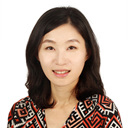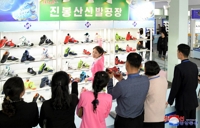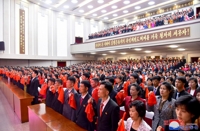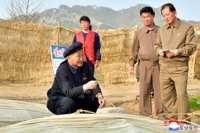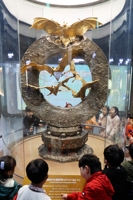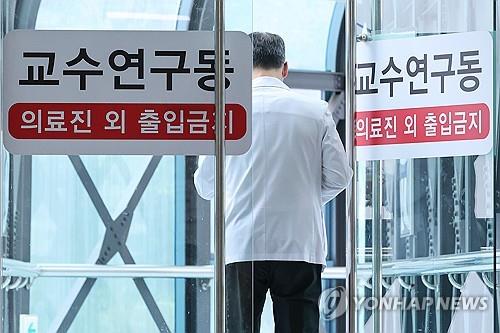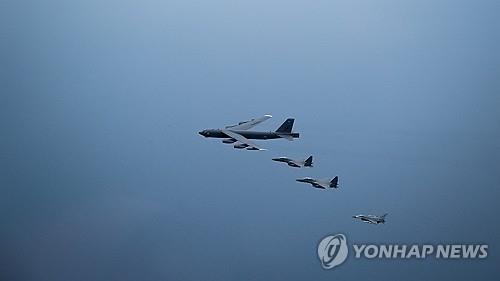(LEAD) Ruling party takes all assembly committee chairman seats in unprecedented unilateral voting
(ATTN: UPDATES with details in paras 8-9, 19-21; ADDS photo)
SEOUL, June 29 (Yonhap) -- Ending a month-long standstill of the National Assembly, the ruling Democratic Party (DP) took all but one of parliament's 18 standing committee chairman seats Monday in unilateral voting boycotted by the main opposition and minor parties.
A parliamentary plenary session, led by the DP, elected 11 representatives from the ruling party to chair the Special Committee on Budget and Accounts, the National Policy Committee as well as nine other parliamentary standing committees.
The chairman seat of the Intelligence Committee was only left empty due to the need for approval by deputy speakers from both the ruling and main opposition party. The seat is also on course to go to the DP after the main opposition United Future Party (UFP) refused to take any chairman posts.
It will put all the leadership seats of the 18 parliamentary standing committees in the hands of the DP after six DP lawmakers were initially elected to head six key committees, including the Legislation and Judiciary Committee, in mid-June.
It is the first time since 1988 that the ruling party monopolizes all the standing committee chairman seats. Since that year, the biggest rival parties have distributed the committee leadership seats between them, breaking from the previous winner-take-all practice.
As they did with the previous voting earlier this month, the UFP boycotted the election voting of the plenary session, accusing the ruling party of sidestepping the main opposition party.
Taking issue with the DP taking the chairmanship of the Legislation and Judiciary Committee, which has customarily been reserved for the main opposition party, the UFP has vehemently resisted the ruling party's efforts to expedite the formation of the standing committees.
On Monday morning, the two rival parties' floor leaders sat down for last-minute negotiations at the mediation of National Assembly Speaker, Rep. Park Byeong-seug, only to see the meeting fall through without an agreement.
UFP floor leader Rep. Joo Ho-young suggested that the chairman post of the Legislation and Judiciary Committee be reserved for his party for the second half of the current four-year parliamentary term which kicked off a month earlier.
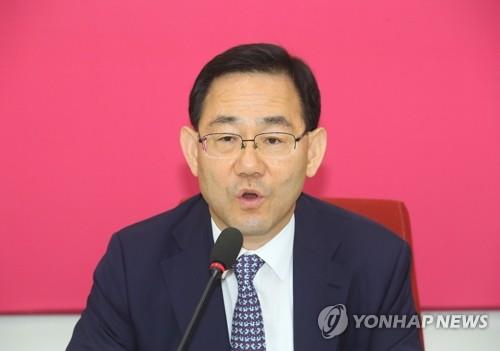
The main opposition United Future Party's floor leader Joo Ho-young speaks during a press meeting in Seoul on June, 29, 2020. (Yonhap)
While being disposed to distribute seven of the 18 committee chairman seats to the UFP as is the custom, however, the DP rejected the UFP's proposal, saying that the legislation committee chair for the second half should go to the next ruling party.
Without any concessions from the ruling party, Joo said in protest that "the UFP decided not to take (any) committee chairman seats ... because (doing otherwise) would only make us a sidekick at the National Assembly that is unilaterally run by the DP."
Joo accused the DP of shattering the time-honored custom of leaving the legislation committee chairman seat to the main opposition while vowing to perform a role as a thorough watchdog against the ruling party.
The minor left-wing Justice Party also boycotted the parliamentary voting, accusing the DP of "one-party monopoly." The minor People's Party also skipped the voting.
Amid continued bipartisan wrangling on the issue, the National Assembly has been at a standstill since its new term began on May 30.
Completing the committee formation, the chamber is to immediately kick off the process to pass a new COVID-19 response special budget bill, which has been pending at the assembly nearly for a month.
"Today marks the first full month since the 21st National Assembly began, but its opening ceremony, as well as the formation of standing committees, have yet to be done. And for that, I feel very sorry," Assembly Speaker Park said at the start of the Monday plenary session.
"The country is in a state of emergency due to the new coronavirus, its economic fallout and inter-Korean tensions," Park said, adding that the National Assembly can no longer be left inactive.
Ending the month-long standstill, the DP and the government are determined to pass the budget bill, the third round of South Korea's virus response extra spending, within this week.
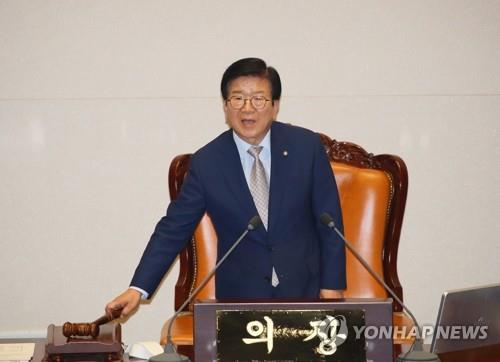
National Assembly Speaker Park Byeong-seug presides over a plenary meeting in Seoul on June 29, 2020, where 11 representatives from the ruling Democratic Party were elected to chair 11 parliamentary standing committees. (Yonhap)
Addressing the National Assembly, Prime Minister Chung Sye-kyun called for swift parliamentary approval of the pending extra budget bill.
"Economic uncertainties are continuing as (we remain unaware of) the start and end of the COVID-19-driven crisis," Chung said. "Only timely injection of sufficient funds can create the virtuous circle ... through which the economy should make a V-shaped rebound," Chung said.
The Monday parliamentary decision put DP floor leader Rep. Kim Tae-nyeon at the chairmanship of the House Steering Committee, Rep. Youn Kwan-suk the National Policy Committee and Rep. Jung Sung-ho the Special Committee on Budget and Accounts, among others.
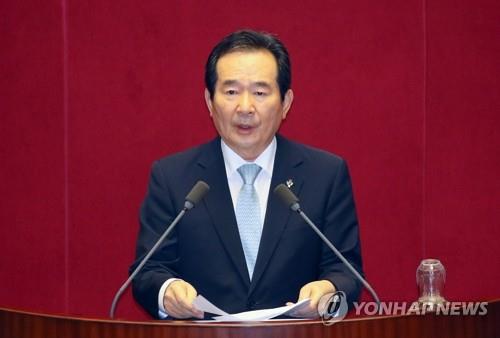
Prime Minister Chung Sye-kyun gives a speech during the National Assembly's plenary session in Seoul on June 29, 2020. (Yonhap)
pbr@yna.co.kr
(END)
-
 Ateez member Yunho throws first pitch at MLB match between Dodgers, Mets
Ateez member Yunho throws first pitch at MLB match between Dodgers, Mets -
 Gov't likely to accept university chiefs' request to lower med school enrollment quota
Gov't likely to accept university chiefs' request to lower med school enrollment quota -
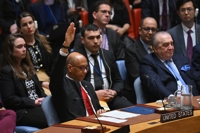 S. Korea supports resolution backing U.N. membership of Palestine
S. Korea supports resolution backing U.N. membership of Palestine -
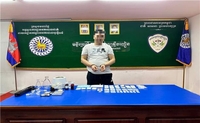 Chinese man behind drug scam targeting teens nabbed in Cambodia
Chinese man behind drug scam targeting teens nabbed in Cambodia -
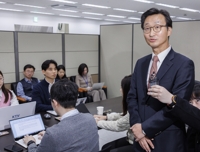 S. Korea, U.S. to hold 1st round of defense cost sharing talks this week
S. Korea, U.S. to hold 1st round of defense cost sharing talks this week
-
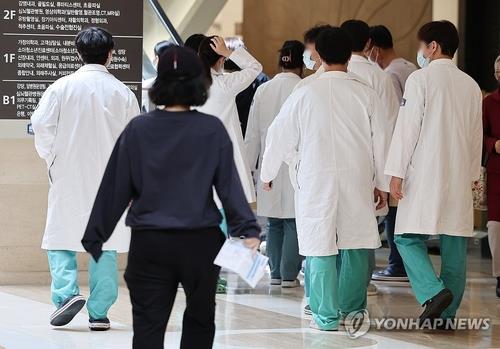 Gov't likely to accept university chiefs' request to lower med school enrollment quota
Gov't likely to accept university chiefs' request to lower med school enrollment quota -
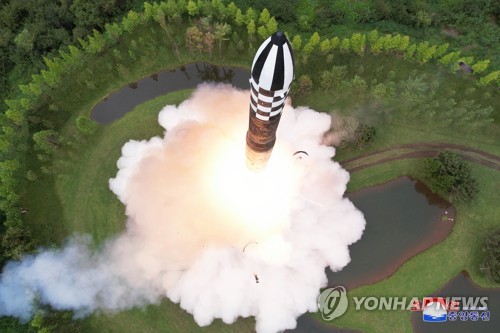 Experts see possibility of N.K. conducting nuclear test before U.S. presidential vote
Experts see possibility of N.K. conducting nuclear test before U.S. presidential vote -
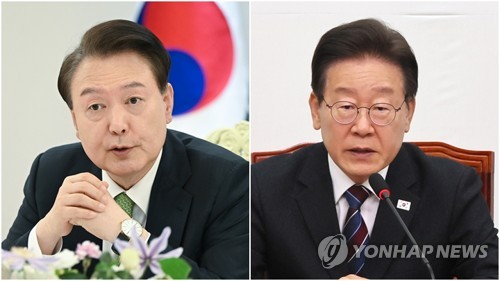 Details of meeting between Yoon, opposition leader undecided: presidential office
Details of meeting between Yoon, opposition leader undecided: presidential office -
 Looming weekly closure of major hospitals feared to worsen medical service crisis
Looming weekly closure of major hospitals feared to worsen medical service crisis -
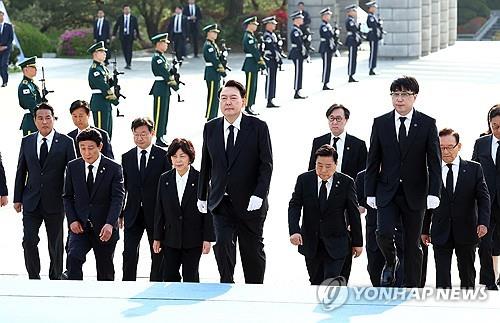 Yoon's approval rating sinks to lowest point since taking office
Yoon's approval rating sinks to lowest point since taking office
-
 (LEAD) Hybe to file complaint against sublabel executives over internal conflict
(LEAD) Hybe to file complaint against sublabel executives over internal conflict -
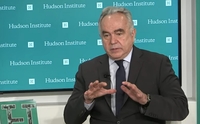 U.S. will take steps for three-way engagement on nuclear deterrence with S. Korea, Japan: Campbell
U.S. will take steps for three-way engagement on nuclear deterrence with S. Korea, Japan: Campbell -
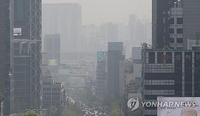 S. Korea reports highest suicide rate, ultra fine dust level among OECD nations: data
S. Korea reports highest suicide rate, ultra fine dust level among OECD nations: data -
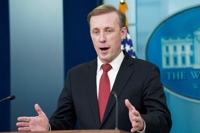 U.S. sent ATACMS missiles to Ukraine following Russia's use of N.K. missiles: White House
U.S. sent ATACMS missiles to Ukraine following Russia's use of N.K. missiles: White House -
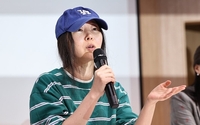 (3rd LD) Hybe to file complaint against sublabel executives over internal conflict
(3rd LD) Hybe to file complaint against sublabel executives over internal conflict
